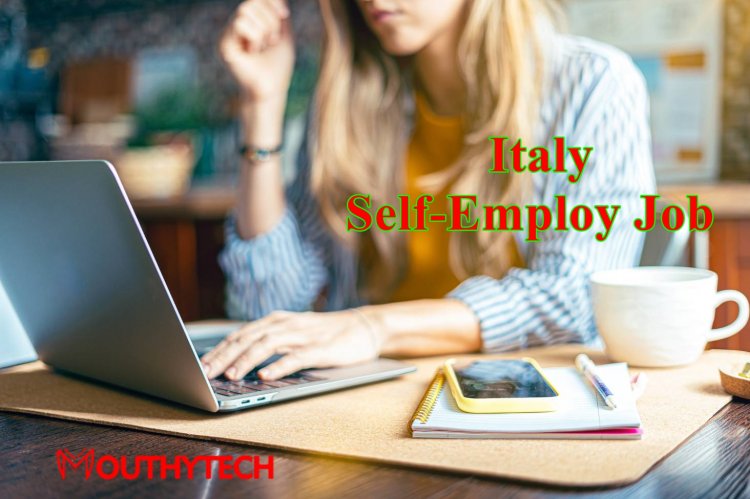Italy Self-Employ Job for Foreigners
If youre new to an area, it can be hard to find work or start your own business. When migrants come to Italy, they have to deal with differences in culture, learn the rules for doing business and working there, and find contacts in the field they want to work in. But if you do things before you move to Italy, you can set yourself up to find a job or be successful on your own. In this article, we are going to brief you on steps to take in order to be self-employed in the country of Italy.

Many foreigners are interested in working for themselves in Italy; this is because the country is a lucrative nation where almost every business flourishes. Therefore, If you're interested in working for yourself or establishing a business in Italy, this article should be of help for you to decide and prepare for the things you need to do on time to get yourselves employed in the state. The first thing to do is to get your Italian self-employ visa; here we start.
What is a visa?
A visa is conditional permission that a country gives to a foreigner to enter, stay in, or leave the country's territory. Visas usually restrict how long a foreigner can stay, where in the country they can go, when they can go, how many times they can visit, or if they can work in the country in question.
What is Italy Visa?
An Italy visa is a stamp on your passport which allows you to enter the country of Italy.
It is permission for you to travel to the country and legally be able to stay either temporarily or permanently. Getting a visa to Italy means that the Italian Consulate or Embassy in your home country decides that you are eligible and fulfill the requirements for entry. However, once you are at the Italian border and customs, it is up to the officers at the border to evaluate whether you are fit to enter or not.
What is Self-employment?
Self-employment means working for yourself instead of for someone else. Most of the time, tax authorities will see a person as self-employed if that person wants to be seen as such or if that person makes enough money that they need to file a tax return.
In the real world, the most important thing for the tax authorities is not whether or not a person is running a business (even providing a service is called "trading"), but whether or not the business is profitable and, therefore, potentially taxable.
In other words, the tax authorities usually don't care about trading that doesn't make a profit. This means that the tax authorities usually don't care about economic activities that people do as a hobby or for fun. People who work for themselves are usually called sole proprietors, independent contractors, or members of partnerships.
Self-employed people usually find their own work instead of getting it from an employer. They make money from a profession, trade, or business that they run.
What is an Italy Self-Employment Visa?
The Italy Self-Employment visa is a type of Italian long-stay visa (national or D-visa). This is the type of visa you must apply for if you intend to work as a freelancer or open a start-up business in Italy.
However, the self-employment visa for Italy is simply an entrance visa. This means it allows you to enter the country, but you still need additional authorization to stay and work there.
You must have the authorization to work and the proper certification depending on what type of work you will perform prior to applying for the visa. You must get these authorizations in Italy while you are still in your home country. This means that you have to hire someone in Italy to assist you in getting these authorizations.
Eligibility Requirements:
You must meet the following requirements to participate as a self-employed person in Italy:
- Own your own business, be self-employed, or work as an independent contractor.
- Have a minimum net profit of $4,600 annually.
- Have a valid license, if required by your occupation.
- Be able to perform all of your normal duties on a full-time basis at the time your application is submitted.
- Receive the major portion of your income from your trade, business, or job as an independent contractor.
- Your business is not seasonal.
- You must stay in the program for two complete calendar years unless you discontinue your business or move out of California.
How to Be Self-Employed in Italy:
EU citizens and people from outside the EU will also have different needs to meet in order to be self-employed in Italy. EU workers can just walk into the country, sign up with the local authorities, and start working for themselves, as long as they follow all the rules and regulations for their particular job. Non-EU citizens, on the other hand, must first apply for a work visa, which is limited by a yearly quota.
You should already know what kind of self-employment you want to do when you apply for a visa. This could fall into one of the following:
- Business owner
- Corporate Role
- Start-up
- Freelancer
- Sports Activity
You will need a provisional clearance from the Questura, the Italian Police Commissary, within 90 days of your visa application.
The second thing you need to do is find the governing body for your field of work at the Italian Chamber of Commerce. This group will give you a declaration of parametri di riferimento, a document that says you can do your job without putting a strain on the Italian economy.
Once you have these documents, the immigration office (SUI) and the Provincial Directorate of Labor verify that you are eligible and fit the quota and can then grant you the work permit.
Before you get started with any kind of trade, make sure you are registered for taxes by requesting a tax and a VAT number. As a self-employed worker, you will be paying taxes on your income at the same rates as other workers in Italy.
Steps You should take to Become Self-employed in the country of Italy:
- Get your visa Ready:
Find out if you need a visa to work in Italy before you move there. Since Italy is part of the European Union (EU), people from other EU countries listed on the EU website don't need a permit to live or work there.
If you're coming from outside the EU, you'll need a work visa, which usually means you need a job in Italy before you can apply. Many migrants who work part-time, for a set amount of time, or seasonally in fields like caregiving will have their work permits set up by their employers.
In most other fields, your employer will help you get a work permit from the Ministry of Interior's immigration department. If you want to start your own business in Italy, you'll need to get your own visa paperwork and application, as well as permission from an administrative authority.
Your application materials should be sent to the embassy or consulate in your home country for you to pick up before you go to Italy.
You should look at the EU Immigration Portal. It will tell you how to apply for a visa, how to get permission to work for yourself, and how to know your rights as a migrant worker.
- Establish residency:
Once you have your work visa, you must register yourself within eight days of your arrival. To sign up, you must go to the Prefettura closest to your place of work, where your personal and work information will be checked. Before you get your residence permit, you'll probably have to go back for a second appointment to have your fingerprints and photo taken. You will also get your "codice fiscale," which is used to register for taxes.
- Set yourself up financially:
Once you have your work and residency permits, you'll need to open an Italian bank account so you can get your hard-earned money. As a foreigner, it's easy to open an account. Most likely, you'll only need your ID, tax code, and proof that you live in Italy.
You might want to choose a bank like UniCredit, Cassa Depositi e Prestiti, or Intesa Sanpaolo that has a national network of branches and ATMs as well as online and mobile banking. Once you've set up your bank account, you can easily manage your payments by entering your account information into your Western Union® app. With Western Union's money transfer services, you can send money to family and friends back home, pay bills, and check exchange rates right from your phone.
- Make your Business Known to the Public:
If you're from outside the EU and want to be self-employed in Italy, you'll need to follow the three steps above and pay attention to other rules for self-employment in Italy.
After you get employment rights in Italy, for example, you'll have to decide if you're a "lavoratore autonomo" (sole trader) or a "libero professionista" (freelancer).
Sole traders include electricians, mechanics, hairstylists, and people who make their own goods. On the other hand, a libero professionista is used by doctors, architects, engineers, and people in other highly trained jobs. Both of these groups have different rules about how to get a job and need different paperwork.
A lawyer or agent can help you understand these documents and register with the Agenzia delle Entrate, Italy's tax agency. This will give you a "partita IVA" (VAT number), which lets you charge tax on your services.
Earn your Income the way you want now:
Getting paid in your new country is excellent, whether you work for someone else or start your own business. Once you finally have a job, a work visa, and a bank account, you can start saving and enjoy seeing your money come in. But don't forget to set up payments to take care of family and friends back home.
Using money transfer services, you can lock in exchange rates at the right time, avoid bank transfer fees, and track one-time or recurring payments to ensure they get to the right place. Making money and caring for your family back home? So everyone wins.
Conclusion
The "Italy self-employ work for Foreigners" article details what Foreigners should do to be self-employed in the country of Italy.
The article explains the meaning of self-employment, the self-employed visa in Italy, the eligibility for self-employment in the country, the steps to get yourself employed in the country as well, etc
What's Your Reaction?




















